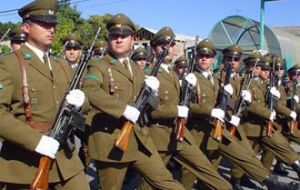MercoPress. South Atlantic News Agency
Chilean judge investigating Carabineros over killing of student
 The Chilean Carabineros, until earlier this year under Defence tutelage, are known for their use of excessive force
The Chilean Carabineros, until earlier this year under Defence tutelage, are known for their use of excessive force An officer from Chile’s gendarmerie-police, Carabineros was asked to resign Monday after admitting to using his firearm in the Macul borough of Santiago near where 16-year-old Manuel Gutiérrez Reinoso was shot and killed Thursday night.
According to Santiago media, the officer, who has been with the Carabineros police force for 18 years, admitted to firing two shots into the air from an UZI machine gun close to midnight Thursday in the same area where Gutiérrez was reportedly shot in the chest. Gutiérrez died Friday morning in a nearby hospital.
Officer Miguel Millacura insists that he fired his weapon only in response to other gunshots fired by protestors in the Macul area after Chile’s two-day national strike on Wednesday and Thursday.
Witnesses, including Manuel’s brother Gerson Gutiérrez who was with him at the time, have insisted since that Carabineros were responsible the youth’s death. Carabineros officials immediately rejected these claims, however, initially refusing to even conduct an internal investigation.
Police maintained this stance until Monday, when Deputy Chief José Luis Ortega confirmed that Millacura was asked to resign for unauthorized use of his firearm. Ortega insisted that the measure was not related to possible involvement in the 16-year-old’s death.
There is still not enough evidence to connect Carabineros to Gutiérrez’s death, Ortega said Monday, explaining that an investigation of the bullet extracted from the youth will help officials better determine whether it came from Millacura’s weapon.
District Attorney Claudio Suizo ordered the collection of 35 police firearms to compare them with the bullet extracted from Gutiérrez on Friday. Deciphering the origin of the bullet is expected take about 15 days.
The announcement about Millacura’s unauthorized firearm use on Monday coincided with public demands by national human rights groups and Chilean activists for investigation into alleged police involvement in Gutiérrez’s death.
On Saturday, student strike leaders demanded further investigation into Gutiérrez’s death as one of their pre-conditions for meeting with Chilean President Sebastián Piñera to discuss education reform.
That same day, Lorena Fries, president of Chile’s National Institute of Human Rights (INDH), publicly criticized Carabineros police officials’ refusal to investigate the claims of police involvement.
“It does not seem like an adequate response by the Carabineros to say we are not going to investigate because we had nothing to do with it,” Fries told Radio Cooperativa, adding that the organization plans to take legal action if someone is not held accountable.
According to Fries, appropriate investigation into Manuel’s death is especially pertinent given the Carabineros police force’s fragile public image, especially in light of allegations of excessive force in the recent citizen demonstrations across Chile.
“We know that there have been incidents of excessive violence in different cities and regions of the country,” Fries said. “(Investigating Gutiérrez death) requires maximum transparency so as to not increase the public’s existing distrust of police activity”.
By Adeline Bash - The Santiago Times




Top Comments
Disclaimer & comment rulesCommenting for this story is now closed.
If you have a Facebook account, become a fan and comment on our Facebook Page!